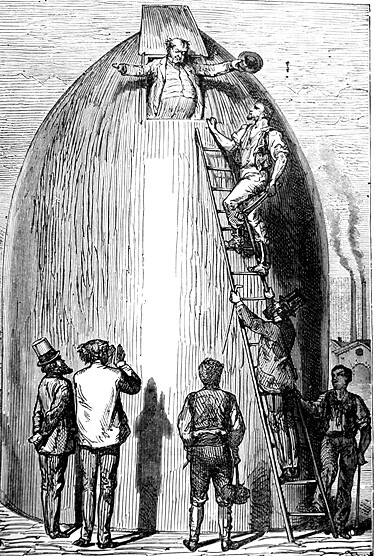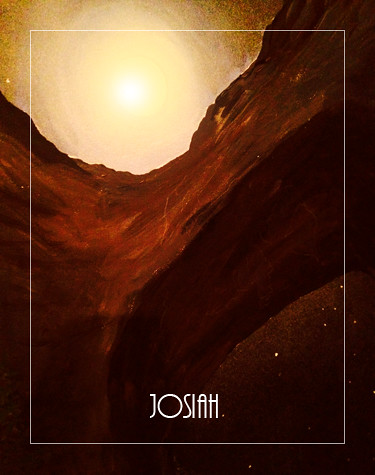
Volume XIV, Issue XV
Josiah
By Bob Kirchman
Copyright © 2018, The Kirchman Studio, all rights reserved
Epilogue: The Bridge of God
For decades it had simply been known as ‘The Great Mystery’ by the colonists. Indeed it was a wonder to them that the opening existed at all. Upon landing, the colonists had discovered the opening that gave entry into the little valley. The fine soil and natural protection had led them to place a substantial part of their greenhouse agriculture in that valley. That was why the colonists survived. Josiah the colonist and Josiah Zimmerman walked through the arch one afternoon in their spacesuits. Josiah the colonist told the story as they stared up at the 90’ wide archway that rose 215’ above them. Young Zimmerman found the whole scene strangely familiar.
Really, this looks just like a place I remember from my boyhood,” young Josiah mused. “It is the spitting image of the Natural Bridge in Rockbridge County. My grandfather would take me there. We would stand under the arch and look up at it. He would whisper “MOHOMONY.” That is what the Monacan Nation called it and it was a sacred place to their people. The name was alternately translated ‘Great Mystery’ or ‘The Bridge of God.’
The Monacans were a Souix people who lived in the Valley of Virginia. Once a band of Monacans were being pursued by a much larger army of Powhatans and in their distress they prayed. They had been pressed to the edge of a deep chasm, the valley of Cedar Creek. Escape was impossible. But looking up they saw the natural bridge that spanned the chasm. They hurried their women and children across it. Now the warriors turned and faced their enemy on the narrow bridge. The larger Powhatan force was reduced by the width of the bridge and that day the Monacans prevailed.” Grandfather never tired of telling that tale.
When the unmanned lander had sent its rover through the arch, no one thought to pan the camera up. It remained a secret until the relief shuttle crew walked through it.
Josiah Zimmerman thought of the Virginia colonists and how they had discovered a bend on the James River that looked just like the bend in the Thames River at a place called Richmond. Thus the capital of the new place took its name from its similarity to a place familiar. Here in a faraway and forbidding place was a scene familiar as well – and even more amazing, it too played in a story of Divine deliverance. In the times to come, it too would become known as ‘MOHOMONY.’
Then Joshua called the twelve men, whom he had prepared of the children of Israel, out of every tribe a man: And Joshua said unto them, Pass over before the ark of the Lord your God into the midst of Jordan, and take you up every man of you a stone upon his shoulder, according unto the number of the tribes of the children of Israel: That this may be a sign among you, that when your children ask their fathers in time to come, saying, What mean ye by these stones? Then ye shall answer them, That the waters of Jordan were cut off before the ark of the covenant of the Lord; when it passed over Jordan, the waters of Jordan were cut off: and these stones shall be for a memorial unto the children of Israel for ever. And the children of Israel did so as Joshua commanded, and took up twelve stones out of the midst of Jordan, as the Lord spake unto Joshua, according to the number of the tribes of the children of Israel, and carried them over with them unto the place where they lodged, and laid them down there. And Joshua set up twelve stones in the midst of Jordan, in the place where the feet of the priests which bare the ark of the covenant stood: and they are there unto this day.” – Joshua 4:4-9
THE END
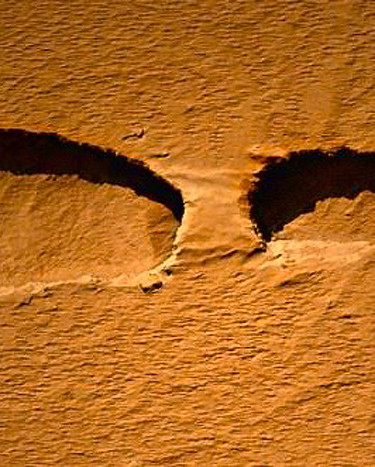
The HiRISE camera on the Mars Reconnaissance Orbiter took an image of a thin channel, and a portion of it contains a naturally occurring bridge over the chasm. Kelly Kolb from the HiRISE team says it is probably a remnant of the original surface, the rest of which has collapsed downward. NASA Photo.
The Ringing of the Gemeinhaus Bell
The Call to Meeting that Saved the Moravians from Slaughter
The Unitas Fratrum, or the Protestant Episcopal Church of the United Brethren, commonly called Moravians, made the beginning of its settlement in North Carolina in the year 1753. The Moravians lived in a Christian Community and sought to reach out to the Creek and Cherokee in the regions they settled in. Single Moravians lived in communal houses and thus were seen as living a life similar to the Native people they sought to minister among. Receiving a tract of land in North Carolina, they built the community of Bethabara, with its central Gemeinhaus. A bell was used to call the townspeople to prayer meeting. But in 1760 the Northern Nations of Native Americans joined with the nations in the South in a war against the English. Bethabara and neighboring Bethany were now under constant threat of attack. That attack never came.
Hostile Indians came often very near their towns, with an intention to destroy them, and to kill the inhabitants or make them prisoners, but never ventured to make an attack. Often times, they were frightened by the ringing of the bell for the meeting at church, which meetings the brethren in both places kept regular on Sundays and every evening in the week.” – History of the Moravians in North Carolina, Page 1148 [1.]
The Moravians would learn of this Divine protection years later in the stories told by their Cherokee neighbors, many of whom embraced Christ as a result of their friendship with the Moravians.
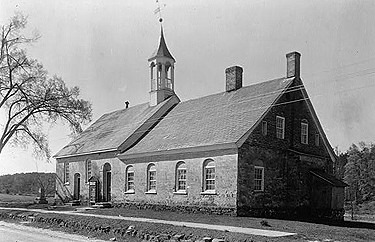
Gemeinhaus at Bethabara.
Bethabara (from the Hebrew, meaning "House of Passage" and pronounced beth-ab-bra, the name of the traditional site of the Baptism of Jesus Christ) was a village located in what is now Forsyth County, North Carolina. It was the site where fifteen men from the Moravian Church first settled in 1753 in an abandoned cabin in the 100,000-acre (400 km2) tract of land the church had purchased from Lord Granville and dubbed Wachovia. Its early settlers were noted for advanced agricultural practices, especially their medicine Garden, which produced over fifty kinds of herbs. Although later parties of Moravians joined the first fifteen, including women and children, Bethabara was never meant to be a permanent settlement. It was intended to house the Moravians until a more suitable location for their central village could be found. In 1771, that place was completed: Salem. Many of the settlers moved to Salem, and Bethabara became an outlying farm to supply the residents of Salem and other Moravian villages with food. In 1788, a slave, Johann Samuel, was named superintendent of the farm; he was freed in 1801, though he continued to rent the land from the church. However, the village of Bethabara, as it existed, was no longer needed, and it fell into disuse. The original buildings collapsed, and their foundations were filled in to make more farm land. Only the church and a few other buildings continued in regular use.
– History of the Moravians in North Carolina
How Richmond, VA was Named
A Place in the New World Reminded Them of Home
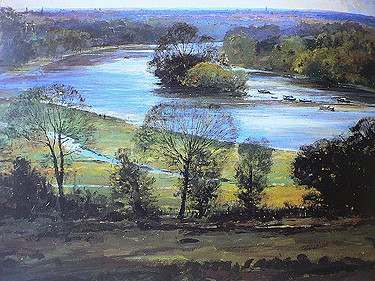
Richmond on the Thames. Painting by Jeremy Barlow, ROI. [1.]
In 1733 William Byrd named Richmond, Virginia because the view of the James River reminded him of this view from Richmond Hill. Many places in the New World take their names from familiar and beloved scenes in the Old Country!
Let poets rave of Arno’s stream,
And painters of the winding Rhine
I will not ask a lovlier dream,
A sweeter scene, fair Thames, than thine;
As neath a summer’s sun decline,
Thou wanderst at thine own sweet will,
Reflecting from thy face divine
The flower-wreathed brow of Richmond Hill.
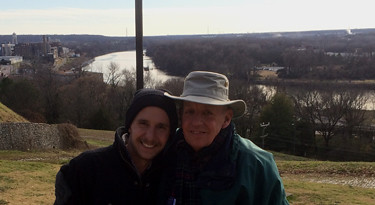
Richmond, Virginia on the James.
Three Days in April
Photos by Bob Kirchman
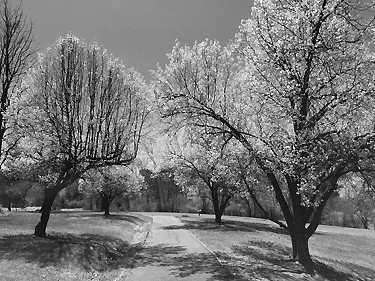
Bradford Pears in Sun...

...and in Snow.
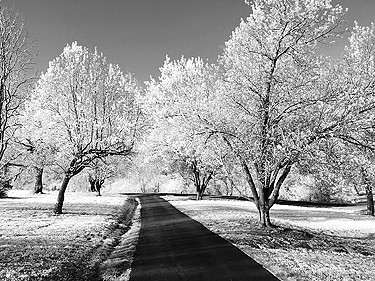
Sun and Snow!
From the Earth to the Moon
By Jules Verne
CHAPTER I, THE GUN CLUB
During the War of the Rebellion, a new and influential club was established in the city of Baltimore in the State of Maryland. It is well known with what energy the taste for military matters became developed among that nation of ship-owners, shopkeepers, and mechanics. Simple tradesmen jumped their counters to become extemporized captains, colonels, and generals, without having ever passed the School of Instruction at West Point; nevertheless; they quickly rivaled their compeers of the old continent, and, like them, carried off victories by dint of lavish expenditure in ammunition, money, and men. But the point in which the Americans singularly distanced the Europeans was in the science of gunnery. Not, indeed, that their weapons retained a higher degree of perfection than theirs, but that they exhibited unheard-of dimensions, and consequently attained hitherto unheard-of ranges. In point of grazing, plunging, oblique, or enfilading, or point-blank firing, the English, French, and Prussians have nothing to learn; but their cannon, howitzers, and mortars are mere pocket-pistols compared with the formidable engines of the American artillery.
This fact need surprise no one. The Yankees, the first mechanicians in the world, are engineers-- just as the Italians are musicians and the Germans metaphysicians-- by right of birth. Nothing is more natural, therefore, than to perceive them applying their audacious ingenuity to the science of gunnery. Witness the marvels of Parrott, Dahlgren, and Rodman. The Armstrong, Palliser, and Beaulieu guns were compelled to bow before their transatlantic rivals.
Now when an American has an idea, he directly seeks a second American to share it. If there be three, they elect a president and two secretaries.
Given four, they name a keeper of records, and the office is ready for work; five, they convene a general meeting, and the club is fully constituted. So things were managed in Baltimore. The inventor of a new cannon associated himself with the caster and the borer. Thus was formed the nucleus of the "Gun Club." In a single month after its formation it numbered 1,833 effective members and 30,565 corresponding members
One condition was imposed as a sine qua non upon every candidate for admission into the association, and that was the condition of having designed, or (more or less) perfected a cannon; or, in default of a cannon, at least a firearm of some description. It may, however, be mentioned that mere inventors of revolvers, fire-shooting carbines, and similar small arms, met with little consideration. Artillerists always commanded the chief place of favor.
The estimation in which these gentlemen were held, according to one of the most scientific exponents of the Gun Club, was "proportional to the masses of their guns, and in the direct ratio of the square of the distances attained by their projectiles."
The Gun Club once founded, it is easy to conceive the result of the inventive genius of the Americans. Their military weapons attained colossal proportions, and their projectiles, exceeding the prescribed limits, unfortunately occasionally cut in two some unoffending pedestrians. These inventions, in fact, left far in the rear the timid instruments of European artillery.
It is but fair to add that these Yankees, brave as they have ever proved themselves to be, did not confine themselves to theories and formulae, but that they paid heavily, in propria persona, for their inventions. Among them were to be counted officers of all ranks, from lieutenants to generals; military men of every age, from those who were just making their debut in the profession of arms up to those who had grown old in the gun-carriage. Many had found their rest on the field of battle whose names figured in the "Book of Honor" of the Gun Club; and of those who made good their return the greater proportion bore the marks of their indisputable valor. Crutches, wooden legs, artificial arms, steel hooks, caoutchouc jaws, silver craniums, platinum noses, were all to be found in the collection; and it was calculated by the great statistician Pitcairn that throughout the Gun Club there was not quite one arm between four persons and two legs between six.
Nevertheless, these valiant artillerists took no particular account of these little facts, and felt justly proud when the despatches of a battle returned the number of victims at ten-fold the quantity of projectiles expended.
One day, however-- sad and melancholy day!-- peace was signed between the survivors of the war; the thunder of the guns gradually ceased, the mortars were silent, the howitzers were muzzled for an indefinite period, the cannon, with muzzles depressed, were returned into the arsenal, the shot were repiled, all bloody reminiscences were effaced; the cotton-plants grew luxuriantly in the well-manured fields, all mourning garments were laid aside, together with grief; and the Gun Club was relegated to profound inactivity.
Some few of the more advanced and inveterate theorists set themselves again to work upon calculations regarding the laws of projectiles. They reverted invariably to gigantic shells and howitzers of unparalleled caliber. Still in default of practical experience what was the value of mere theories? Consequently, the clubrooms became deserted, the servants dozed in the antechambers, the newspapers grew mouldy on the tables, sounds of snoring came from dark corners, and the members of the Gun Club, erstwhile so noisy in their seances, were reduced to silence by this disastrous peace and gave themselves up wholly to dreams of a Platonic kind of artillery.
This is horrible!" said Tom Hunter one evening, while rapidly carbonizing his wooden legs in the fireplace of the smoking-room; "nothing to do! nothing to look forward to! what a loathsome existence! When again shall the guns arouse us in the morning with their delightful reports?"
Those days are gone by," said jolly Bilsby, trying to extend his missing arms.
It was delightful once upon a time! One invented a gun, and hardly was it cast, when one hastened to try it in the face of the enemy! Then one returned to camp with a word of encouragement from Sherman or a friendly shake of the hand from McClellan. But now the generals are gone back to their counters; and in place of projectiles, they despatch bales of cotton. By Jove, the future of gunnery in America is lost!"
Ay! and no war in prospect!" continued the famous James T. Maston, scratching with his steel hook his gutta-percha cranium. "Not a cloud on the horizon! and that too at such a critical period in the progress of the science of artillery! Yes, gentlemen! I who address you have myself this very morning perfected a model (plan, section, elevation, etc.) of a mortar destined to change all the conditions of warfare!"
No! is it possible?" replied Tom Hunter, his thoughts reverting involuntarily to a former invention of the Hon. J. T. Maston, by which, at its first trial, he had succeeded in killing three hundred and thirty-seven people.
Fact!" replied he. "Still, what is the use of so many studies worked out, so many difficulties vanquished? It's mere waste of time! The New World seems to have made up its mind to live in peace; and our bellicose Tribune predicts some approaching catastrophes arising out of this scandalous increase of population."
Nevertheless," replied Colonel Blomsberry, "they are always struggling in Europe to maintain the principle of nationalities."
Well?"
Well, there might be some field for enterprise down there; and if they would accept our services----"
What are you dreaming of?" screamed Bilsby; "work at gunnery for the benefit of foreigners?" "That would be better than doing nothing here," returned the colonel.
Quite so," said J. T. Matson; "but still we need not dream of that expedient."
And why not?" demanded the colonel.
Because their ideas of progress in the Old World are contrary to our American habits of thought. Those fellows believe that one can't become a general without having served first as an ensign; which is as much as to say that one can't point a gun without having first cast it oneself!"
Ridiculous!" replied Tom Hunter, whittling with his bowie-knife the arms of his easy chair; "but if that be the case there, all that is left for us is to plant tobacco and distill whale-oil."
What!" roared J. T. Maston, "shall we not employ these remaining years of our life in perfecting firearms? Shall there never be a fresh opportunity of trying the ranges of projectiles? Shall the air never again be lighted with the glare of our guns? No international difficulty ever arise to enable us to declare war against some transatlantic power? Shall not the French sink one of our steamers, or the English, in defiance of the rights of nations, hang a few of our countrymen?"
No such luck," replied Colonel Blomsberry; "nothing of the kind is likely to happen; and even if it did, we should not profit by it. American susceptibility is fast declining, and we are all going to the dogs."
It is too true," replied J. T. Maston, with fresh violence; "there are a thousand grounds for fighting, and yet we don't fight. We save up our arms and legs for the benefit of nations who don't know what to do with them! But stop-- without going out of one's way to find a cause for war-- did not North America once belong to the English?"
Undoubtedly," replied Tom Hunter, stamping his crutch with fury. "Well, then," replied J. T. Maston, "why should not England in her turn belong to the Americans?"
It would be but just and fair," returned Colonel Blomsberry.
Go and propose it to the President of the United States," cried J. T. Maston, "and see how he will receive you."
Bah!" growled Bilsby between the four teeth which the war had left him; "that will never do!"
By Jove!" cried J. T. Maston, "he mustn't count on my vote at the next election!"
Nor on ours," replied unanimously all the bellicose invalids.
Meanwhile," replied J. T. Maston, "allow me to say that, if I cannot get an opportunity to try my new mortars on a real field of battle, I shall say good-by to the members of the Gun Club, and go and bury myself in the prairies of Arkansas!"
In that case we will accompany you," cried the others.
Matters were in this unfortunate condition, and the club was threatened with approaching dissolution, when an unexpected circumstance occurred to prevent so deplorable a catastrophe.
On the morrow after this conversation every member of the association received a sealed circular couched in the following terms:
BALTIMORE, October 3. The president of the Gun Club has the honor to inform his colleagues that, at the meeting of the 5th instant, he will bring before them a communication of an extremely interesting nature. He requests, therefore, that they will make it convenient to attend in accordance with the present invitation. Very cordially, IMPEY BARBICANE, P.G.C.
CHAPTER II, PRESIDENT BARBICANE'S COMMUNICATION
On the 5th of October, at eight p.m., a dense crowd pressed toward the saloons of the Gun Club at No. 21 Union Square. All the members of the association resident in Baltimore attended the invitation of their president. As regards the corresponding members, notices were delivered by hundreds throughout the streets of the city, and, large as was the great hall, it was quite inadequate to accommodate the crowd of savants. They overflowed into the adjoining rooms, down the narrow passages, into the outer courtyards. There they ran against the vulgar herd who pressed up to the doors, each struggling to reach the front ranks, all eager to learn the nature of the important communication of President Barbicane; all pushing, squeezing, crushing with that perfect freedom of action which is so peculiar to the masses when educated in ideas of "self-government."
On that evening a stranger who might have chanced to be in Baltimore could not have gained admission for love or money into the great hall. That was reserved exclusively for resident or corresponding members; no one else could possibly have obtained a place; and the city magnates, municipal councilors, and "select men" were compelled to mingle with the mere townspeople in order to catch stray bits of news from the interior.
Nevertheless the vast hall presented a curious spectacle. Its immense area was singularly adapted to the purpose. Lofty pillars formed of cannon, superposed upon huge mortars as a base, supported the fine ironwork of the arches, a perfect piece of cast-iron lacework. Trophies of blunderbuses, matchlocks, arquebuses, carbines, all kinds of firearms, ancient and modern, were picturesquely interlaced against the walls. The gas lit up in full glare myriads of revolvers grouped in the form of lustres, while groups of pistols, and candelabra formed of muskets bound together, completed this magnificent display of brilliance. Models of cannon, bronze castings, sights covered with dents, plates battered by the shots of the Gun Club, assortments of rammers and sponges, chaplets of shells, wreaths of projectiles, garlands of howitzers-- in short, all the apparatus of the artillerist, enchanted the eye by this wonderful arrangement and induced a kind of belief that their real purpose was ornamental rather than deadly.
At the further end of the saloon the president, assisted by four secretaries, occupied a large platform. His chair, supported by a carved gun-carriage, was modeled upon the ponderous proportions of a 32-inch mortar. It was pointed at an angle of ninety degrees, and suspended upon truncheons, so that the president could balance himself upon it as upon a rocking-chair, a very agreeable fact in the very hot weather. Upon the table (a huge iron plate supported upon six carronades) stood an inkstand of exquisite elegance, made of a beautifully chased Spanish piece, and a sonnette, which, when required, could give forth a report equal to that of a revolver. During violent debates this novel kind of bell scarcely sufficed to drown the clamor of these excitable artillerists.
In front of the table benches arranged in zigzag form, like the circumvallations of a retrenchment, formed a succession of bastions and curtains set apart for the use of the members of the club; and on this especial evening one might say, "All the world was on the ramparts." The president was sufficiently well known, however, for all to be assured that he would not put his colleagues to discomfort without some very strong motive. Impey Barbicane was a man of forty years of age, calm, cold, austere; of a singularly serious and self-contained demeanor, punctual as a chronometer, of imperturbable temper and immovable character; by no means chivalrous, yet adventurous withal, and always bringing practical ideas to bear upon the very rashest enterprises; an essentially New Englander, a Northern colonist, a descendant of the old anti-Stuart Roundheads, and the implacable enemy of the gentlemen of the South, those ancient cavaliers of the mother country. In a word, he was a Yankee to the backbone.
Barbicane had made a large fortune as a timber merchant. Being nominated director of artillery during the war, he proved himself fertile in invention. Bold in his conceptions, he contributed powerfully to the progress of that arm and gave an immense impetus to experimental researches.
He was personage of the middle height, having, by a rare exception in the Gun Club, all his limbs complete. His strongly marked features seemed drawn by square and rule; and if it be true that, in order to judge a man's character one must look at his profile, Barbicane, so examined, exhibited the most certain indications of energy, audacity, and sang-froid.
At this moment he was sitting in his armchair, silent, absorbed, lost in reflection, sheltered under his high-crowned hat-- a kind of black cylinder which always seems firmly screwed upon the head of an American.
Just when the deep-toned clock in the great hall struck eight, Barbicane, as if he had been set in motion by a spring, raised himself up. A profound silence ensued, and the speaker, in a somewhat emphatic tone of voice, commenced as follows:
My brave, colleagues, too long already a paralyzing peace has plunged the members of the Gun Club in deplorable inactivity. After a period of years full of incidents we have been compelled to abandon our labors, and to stop short on the road of progress. I do not hesitate to state, baldly, that any war which would recall us to arms would be welcome!" (Tremendous applause!) "But war, gentlemen, is impossible under existing circumstances; and, however we may desire it, many years may elapse before our cannon shall again thunder in the field of battle. We must make up our minds, then, to seek in another train of ideas some field for the activity which we all pine for."
The meeting felt that the president was now approaching the critical point, and redoubled their attention accordingly.
For some months past, my brave colleagues," continued Barbicane, "I have been asking myself whether, while confining ourselves to our own particular objects, we could not enter upon some grand experiment worthy of the nineteenth century; and whether the progress of artillery science would not enable us to carry it out to a successful issue. I have been considering, working, calculating; and the result of my studies is the conviction that we are safe to succeed in an enterprise which to any other country would appear wholly impracticable. This project, the result of long elaboration, is the object of my present communication. It is worthy of yourselves, worthy of the antecedents of the Gun Club; and it cannot fail to make some noise in the world."
A thrill of excitement ran through the meeting.
Barbicane, having by a rapid movement firmly fixed his hat upon his head, calmly continued his harangue:
There is no one among you, my brave colleagues, who has not seen the Moon, or, at least, heard speak of it. Don't be surprised if I am about to discourse to you regarding the Queen of the Night.
It is perhaps reserved for us to become the Columbuses of this unknown world. Only enter into my plans, and second me with all your power, and I will lead you to its conquest, and its name shall be added to those of the thirty-six states which compose this Great Union."
Three cheers for the Moon!" roared the Gun Club, with one voice.
The moon, gentlemen, has been carefully studied," continued Barbicane; "her mass, density, and weight; her constitution, motions, distance, as well as her place in the solar system, have all been exactly determined. Selenographic charts have been constructed with a perfection which equals, if it does not even surpass, that of our terrestrial maps. Photography has given us proofs of the incomparable beauty of our satellite; all is known regarding the moon which mathematical science, astronomy, geology, and optics can learn about her. But up to the present moment no direct communication has been established with her."
A violent movement of interest and surprise here greeted this remark of the speaker.
Permit me," he continued, "to recount to you briefly how certain ardent spirits, starting on imaginary journeys, have penetrated the secrets of our satellite. In the seventeenth century a certain David Fabricius boasted of having seen with his own eyes the inhabitants of the moon. In 1649 a Frenchman, one Jean Baudoin, published a `Journey performed from the Earth to the Moon by Domingo Gonzalez,' a Spanish adventurer. At the same period Cyrano de Bergerac published that celebrated `Journeys in the Moon' which met with such success in France. Somewhat later another Frenchman, named Fontenelle, wrote `The Plurality of Worlds,' a chef-d'oeuvre of its time. About 1835 a small treatise, translated from the New York American, related how Sir John Herschel, having been despatched to the Cape of Good Hope for the purpose of making there some astronomical calculations, had, by means of a telescope brought to perfection by means of internal lighting, reduced the apparent distance of the moon to eighty yards! He then distinctly perceived caverns frequented by hippopotami, green mountains bordered by golden lace-work, sheep with horns of ivory, a white species of deer and inhabitants with membranous wings, like bats. This brochure, the work of an American named Locke, had a great sale. But, to bring this rapid sketch to a close, I will only add that a certain Hans Pfaal, of Rotterdam, launching himself in a balloon filled with a gas extracted from nitrogen, thirty-seven times lighter than hydrogen, reached the moon after a passage of nineteen hours. This journey, like all previous ones, was purely imaginary; still, it was the work of a popular American author-- I mean Edgar Poe!"
Cheers for Edgar Poe!" roared the assemblage, electrified by their president's words. "I have now enumerated," said Barbicane, "the experiments which I call purely paper ones, and wholly insufficient to establish serious relations with the Queen of the Night. Nevertheless, I am bound to add that some practical geniuses have attempted to establish actual communication with her. Thus, a few days ago, a German geometrician proposed to send a scientific expedition to the steppes of Siberia. There, on those vast plains, they were to describe enormous geometric figures, drawn in characters of reflecting luminosity, among which was the proposition regarding the `square of the hypothenuse,' commonly called the `Ass's Bridge' by the French. `Every intelligent being,' said the geometrician, `must understand the scientific meaning of that figure. The Selenites, do they exist, will respond by a similar figure; and, a communication being thus once established, it will be easy to form an alphabet which shall enable us to converse with the inhabitants of the moon.' So spoke the German geometrician; but his project was never put into practice, and up to the present day there is no bond in existence between the Earth and her satellite. It is reserved for the practical genius of Americans to establish a communication with the sidereal world.
The means of arriving thither are simple, easy, certain, infallible-- and that is the purpose of my present proposal."
A storm of acclamations greeted these words. There was not a single person in the whole audience who was not overcome, carried away, lifted out of himself by the speaker's words!
Long-continued applause resounded from all sides.
As soon as the excitement had partially subsided, Barbicane resumed his speech in a somewhat graver voice.
You know," said he, "what progress artillery science has made during the last few years, and what a degree of perfection firearms of every kind have reached. Moreover, you are well aware that, in general terms, the resisting power of cannon and the expansive force of gunpowder are practically unlimited. Well! starting from this principle, I ask myself whether, supposing sufficient apparatus could be obtained constructed upon the conditions of ascertained resistance, it might not be possible to project a shot up to the moon?"
At these words a murmur of amazement escaped from a thousand panting chests; then succeeded a moment of perfect silence, resembling that profound stillness which precedes the bursting of a thunderstorm. In point of fact, a thunderstorm did peal forth, but it was the thunder of applause, or cries, and of uproar which made the very hall tremble. The president attempted to speak, but could not. It was fully ten minutes before he could make himself heard.
Suffer me to finish," he calmly continued. "I have looked at the question in all its bearings, I have resolutely attacked it, and by incontrovertible calculations I find that a projectile endowed with an initial velocity of 12,000 yards per second, and aimed at the moon, must necessarily reach it. I have the honor, my brave colleagues, to propose a trial of this little experiment."
(to be continued)
